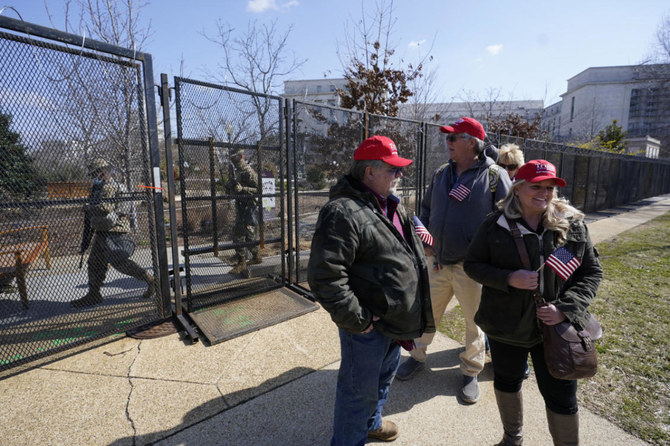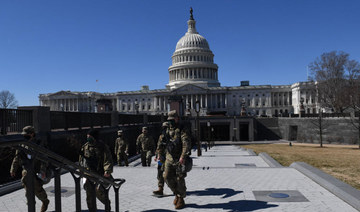WASHINGTON: Worried about continuing threats, the acting chief of the US Capitol Police appealed to congressional leaders Thursday to use their influence to keep National Guard troops at the Capitol, two months after the law enforcement breakdowns of the deadly Jan. 6 insurrection.
Yogananda Pittman told the leaders in a letter obtained by The Associated Press that the board that oversees her department has so far declined to extend an emergency declaration required by the Pentagon to keep Guardsmen who have assisted Capitol officers since the riot.
Pittman said she needed the leaders’ assistance with the three-member Capitol Police Board, which reports to them. She said the board has sent her a list of actions it wants her to implement, though she said it was unclear whether the points were orders or just recommendations.
The letter underscored the confusion over how best to secure the Capitol after a dismal lack of protection in January and biting criticism for law enforcement’s handling of the invasion.
And it came came as authorities spent the day on high alert, primed for a “possible plot” by a militia group to storm the building again, two months after Trump supporters smashed through windows and doors in an insurrection meant to halt the certification of Joe Biden’s presidential victory.
The list in the letter to lawmakers included a partial removal of the imposing fence encircling the Capitol grounds starting Monday and a drawdown of the Guard to 900 troops from the current 5,200 remaining in Washington.
Police want to keep the fence indefinitely. In her letter, Pittman said she would ask for a drawdown of the deployment “based on the threat environment and physical and operational security capabilities.”
Earlier Thursday, The Associated Press reported the Pentagon was reviewing a Capitol Police request to keep up to 2,200 Guardsmen at the Capitol another 60 days. A statement from the police said Pittman had formally made the recommendation to the Pentagon.
A similar dispute had erupted between the Capitol Police and its board before Jan. 6 and even as rioters were storming the building. The Capitol Police Board, comprised of the House and Senate sergeants at arms and the architect of the Capitol, is charged with oversight of the police force.
Steven Sund, the now-former Capitol Police chief, has testified to Congress that he wanted to request the Guard two days before the invasion following reports that white supremacist and far-right groups would target the building to disrupt the certification of Biden’s election victory over outgoing President Donald Trump. Paul Irving, who served on the Capitol Police Board as House sergeant-at-arms, denied that Sund asked him to call the Guard.
Sund has testified that he asked repeatedly for the Guard to be called as rioters stormed the building, breaking police lines and running over officers unequipped to hold them off. He ultimately called the commanding general of the D.C. National Guard just before 2 p.m., who in turn testified that the request for help was delayed by the Defense Department. The request was not approved until after 5 p.m., as hundreds of rioters marauded through the building and left without being arrested.
Five people died in the riot, including a Capitol Police officer and a Trump supporter shot by police.
On Thursday, despite the warnings of new trouble, there were no signs of disturbance at the heavily secured building. Nor was there evidence of any large group heading to Washington.
The most recent threat appeared to be connected to a far-right conspiracy theory, mainly promoted by supporters of QAnon, that former Trump would rise again to power on March 4 and that thousands would come to Washington to try to remove Democrats from office. March 4 was the original presidential inauguration day until 1933, when it was moved to Jan. 20.
But Trump was miles away in Florida. In Washington, on one of the warmest days in weeks, the National Mall was almost deserted, save for joggers, journalists, and a handful of tourists trying to take photos of the Capitol dome through the fencing.
Online chatter identified by authorities included discussions among members of the Three Percenters, an anti-government militia group, concerning possible plots against the Capitol on Thursday, according to two law enforcement officials who were not authorized to speak publicly and spoke on condition of anonymity. Members of the Three Percenters were among the extremists who stormed the Capitol on Jan. 6.
But federal agents found no significant increases in the number of hotel rooms being rented in Washington, or in flights to the area, car rental reservations or buses being chartered. Online chatter about the day on extremist sites was declining.
US Rep. Michael McCaul, R-Texas, was briefed by law enforcement about the possible threat and said lawmakers were braced for whatever might come.
“We have the razor wire, we have the National Guard. We didn’t have that January 6. So I feel very confident in the security,” he said.
But those measures aren’t permanent. Some states have threatened to pull their Guardsmen amid reports that some troops had been made to take rest breaks in parking garages or served spoiled food. Other Guardsmen have said they have been given good meals with accommodations for those on vegan or halal diets.
In Michigan, which sent 1,000 troops, Democratic Gov. Gretchen Whitmer said she did “not have any intention of agreeing to an extension of this deployment.”
Meanwhile, Trump continues to promote lies that the election was stolen from him through mass voter fraud, even though such claims have been rejected by judges and Trump’s former attorney general. He repeatedly told those lies on social media and in a charged speech on Jan. 6 in which he implored thousands of supporters to “fight like hell.” Many of those supporters eventually walked to the Capitol grounds and overran officers to breach the building.
Trump was impeached by the House on a c harge of incitement of insurrection but was acquitted by the Senate. So far, about 300 people have been charged with federal crimes for their roles in the riot.
Trump’s election rhetoric continues to be echoed by many national and local Republicans posting online messages about voter fraud and questioning the legitimacy of Biden’s victory.
White House Press Secretary Jen Psaki cited “a years-long trend of false narratives fueling violence.”
“On the specifics of today’s threats, the FBI and DHS have warned that the threat of domestic violent extremism, particularly racially motivated and anti-government extremists, did not begin or end on January 6 and we have been vigilant day in and day out,” she said Thursday.























